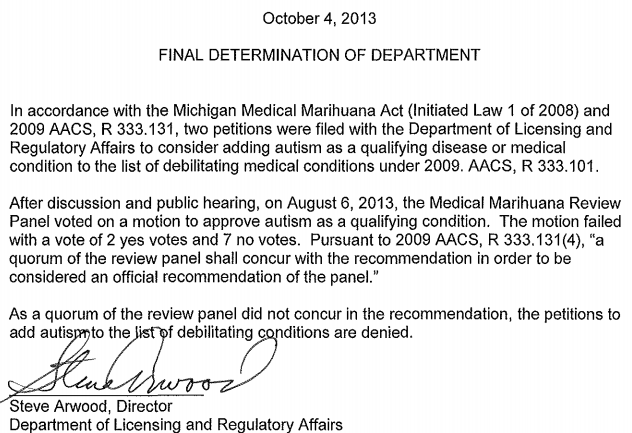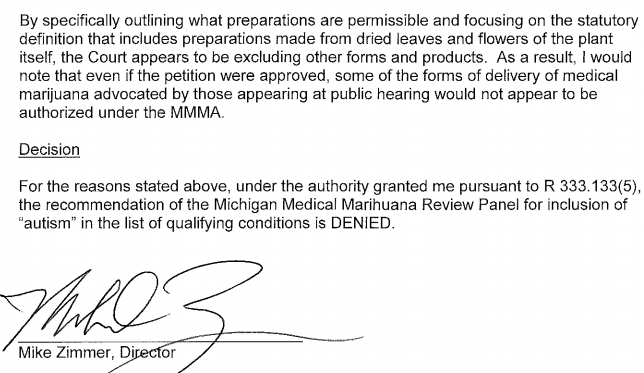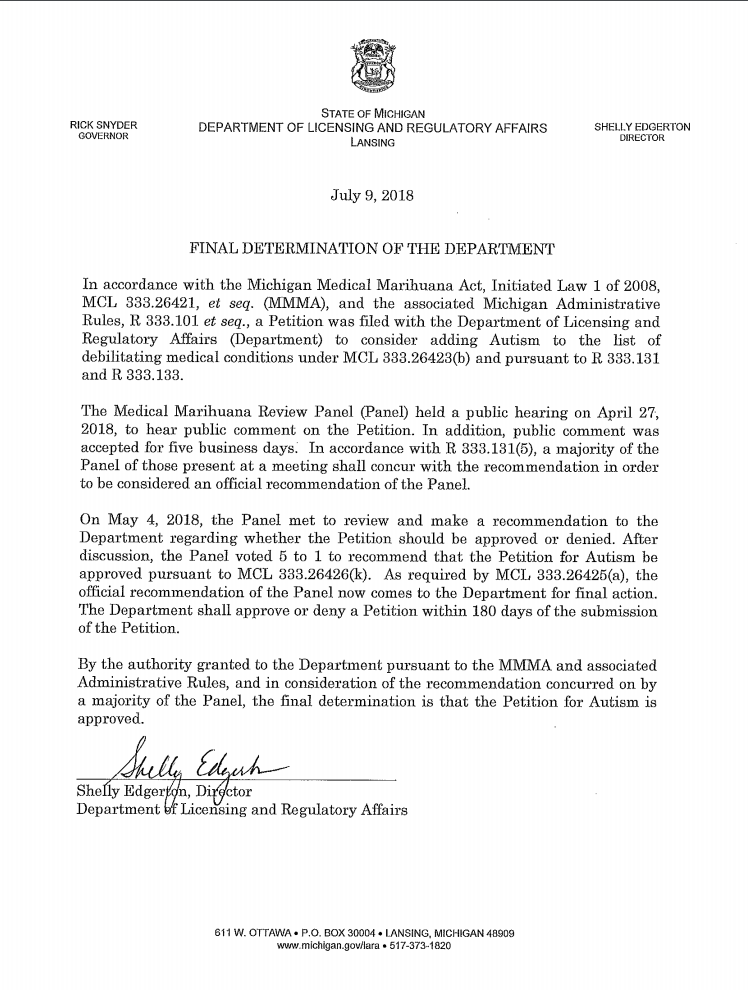Years of blood, sweat and tears to get Autism as a Qualifying Condition in the MMMA.
We have come a long way from 2013, when a parent submitted the first petition to add Autism as a qualifying condition within the Michigan Medical Marijuana Act. It was ultimately rejected due to a lack of any research materials and testimony.

http://komornlaw.com/wp-content/uploads/2018/02/Final_Determination_Autism_436526_7.pdf
In 2014, a Parent tried to submit a new Autism petition with some testimony about physicians treating Autism patients who qualify due to also having epilepsy. LARA rejected this petition because it said it had "issued its final decision" on Autism and would not reconsider new evidence.
Komorn Law stepped in to protect the rights of the petitioner and her family member with Autism. We filed a lawsuit against LARA to force them to hear the new petition with the new testimony and new scientific research. After stalling for months and months in court, LARA gave up the fight and decided to hear the petition.
The Medical Marihuana Review Panel held a public meeting and took public testimony. But the patient advocate panel member noticed that LARA had withheld the scientific research presented with the petition, depriving the review panel from the evidence! The panel postponed the vote on adding Autism until they had a chance to review the information.
ARE YOU SERIOUS? LARA HOLDING THE SCIENCE FROM THE PANEL?
https://www.mlive.com/news/detroit/index.ssf/2015/07/michigan_panel_delays_decision.html
Dr. Christian Bogner testified in support of treating Autism with medical marijuana. He described his scientific theory on why Autism has been increasing, restated here on the Dr. Nandi show shortly after he testified in 2015.
After hearing all of these parents begging for any option of a remedy to help their families, the review panel voted to recommend adding Autism as a condition in 2015.
https://www.michigan.gov/lara/0,4601,7-154-79571_79575_79582-358181--,00.html
Mike Zimmer, the Director of LARA, issued a 4 page opinion on why he was rejecting adding Autism as a qualifying condition to the MMMA. In his opinion he stated multiple reasons why he was rejecting the condition.
- The petition used some language describing symptoms as "severe autism" but the petition was only for "autism" not "severe autism" , thus any person with "autism" could qualify for the medical use of marihuana.
- A lack of clinical based studies and scientific evidence and research on marijuana and Autism.
- That the MMMA did not require a physician recommending marihuana to be an expert in Autism or marihuana.
- That the "petition failed to acknowledge the direct impact on children"
- Some of the forms of delivery of medical marijuana (oils, extracts and edibles) advocated by those appearing at public hearing would not appear to be authorized under the MMMA. Mr. Zimmer was saying that because of a court opinion, he thought that some forms of medical marijuana were illegal.
We were completely knocked out by this denial and rejection. LARA Director Mike Zimmer delivered a knock out. We dotted the i's and crossed the t's, we played the court game, we forced LARA to hear a new Autism petition with physicians and parents testifying. Autism was fully rejected in 2015.
That did not stop the parents, the families who have to deal and cope and live with Autism every day. This fight for a non-toxic medicine was far from over.

QuoteAttorney Michael Komorn
“Allowing medical marijuana for those with autism was supposed to be the clinical trial,” Komorn said. “Instead, we’re going to have criminal trials.”
QuoteThe state panel in 2012 and 2014 rejected allowing medical marijuana for autism. It led to a court battle and a challenge by Attorney General Bill Schuette before the panel accepted the latest formal request in the spring.
QuoteLast week, Dwight Zahringer flew to Denver to attend the annual conference of the Autism Society, the nation's oldest nonprofit group devoted to promoting autism education and treatment. His goal was to find an expert who would talk about medical marijuana.
There were none. That fits the overall stance of the Autism Society, said Jim Ball, a behavioral therapist in Princeton, N.J., and executive chairman of the organization, based in Bethesda, Md.
"At this time, we don't support medical marijuana because right now the research basis is just not there," Ball said. He treats children with Applied Behavior Analysis, which he called the standard of care for autism. Applied Behavioral Analysis was a main topic at the Autism Society's convention. And it's the approach that has been time-consuming but of limited benefit for Brunello, Dwight Zahringer said.
Meanwhile, other petitions have been rejected 2013-2016 , including Anxiety, Parkinson's Disease, Asthma, Insomnia, Manic Depression and Retinitis Pigmentosa. Only Post Traumatic Stress Disorder has been approved as a new condition.
https://www.michigan.gov/lara/0,4601,7-154-79571_79575_79582-360123--,00.html
Some of the petitions were denied due to there only being 6 panel members attending the public meetings. LARA decided that this was too few and would deny the conditions based on this "quorum" rule, that they themselves created. After some back and forth they finally changed this and made the administrative rules right. LARA did not reevaluate its decisions on the petitions that were rejected for a bogus internal reason however.
Since almost every petition to add a new condition had been defeated, any morale and fighting spirit to continue petitioning for new conditions had petered out. LARA continued to add more and more hoops for petitioners, requiring that any petition to add a condition now MUST HAVE scientific research attached or it would be instantly rejected. That requirement sound reasonable, we all want our medical decisions to be based in science and peer-reviewed medical journals.
However, the absurdity of this research requirement is illustrated by the actions of the National Institute of Health and the National Institute on Drug Abuse, which grants funding for research on medicine.
Back in 2010, the New York Times asked NIDA what kind of research they fund on marijuana.
https://www.nytimes.com/2010/01/19/health/policy/19marijuana.html
Quote“As the National Institute on Drug Abuse, our focus is primarily on the negative consequences of marijuana use,” said Shirley Simson, a spokeswoman for the drug abuse institute, known as NIDA. “We generally do not fund research focused on the potential beneficial medical effects of marijuana.”
The article goes on to detail multiple researchers who have waited YEARS to research marijuana benefits, not even requesting a grant, but self or privately funded research gets delayed.
This delay, roadblock and hoop jumping is typical with research on marijuana, and it continues to this day. Researchers have even been "let go" for trying to research marijuana.
Local Michigan parent and 2015 Autism petitioner Dwight Zahringer, blogging his journey with Autism at the AutismDad website, did not give up on his son. Dwight was ready for another FIGHT, another petition. Something to help his child and all of the other families struggling with the terribly debilitating Autism diagnosis.
The fight was on again!
After losing so badly in 2015, we wanted to make sure we studied our failures as well as the weaknesses of the process of petitioning. Our new strategy going forwards was to study every single comment and complaint that every LARA director and LARA employee and review panel member made on the petitions over the last 5 years. Dwight was very patient waiting for us as we spent a year working on this project. After we learned each and every concern, complaint and comment , we used that information to build a massive resource of peer-reviewed scientific and medical research on marijuana to present to the review panel.
Encouraged by the community and by her own son's transformation from an angry punching autism ball of anxiety into a loving child again, Michigan mom Amie Carter stepped up to be the petitioner on the 2018 petition. We took the original 2015 petition, cleaned it up, added new research from the past 3 years and resubmitted it in January 2018. While there has not been much research for marijuana and autism in the past 3 years, there has been a lot of research on the safety of marijuana and medical marijuana. We submitted many studies on the safety and efficacy of medical marijuana so that the panel could see the difference between the conventional and traditional treatment for autism versus medical marijuana. As all of the research and government reports have shown from years and years of research, marijuana is non-toxic, has no long term physical or mental effects and very few serious side effects. The most common side effects being drowsiness, euphoria, dry mouth and fatigue. This is in vast contrast to the serious, dangerous and sometimes fatal side effects of the prescription drugs that autism patients are routinely prescribed on a daily basis.
http://www.health.state.mn.us/topics/cannabis/about/firstyearreport.html
We waited for LARA to review our petitions. Three months later LARA scheduled two public meetings for our petitions.
The review panel is appointed by the Governor of Michigan and composed of physicians and one non-physician patient advocate. Only one of the physicians on the panel had intimate knowledge and had treated medical marijuana patients. On April 27th 2018, the review panel held a public meeting for public testimony in Lansing.
Due to LARA's stonewalling and discouraging of petitions over the years, almost everyone had given up on the petition process. Less than a dozen people testified in support of the conditions at the April 27th 2018 meeting. No one testified in opposition to the conditions. This is in stark contrast to the many families who showed up in 2015 to testify in support, and went to the panel begging for their help to allow them to use a non toxic medicine for Autism.
The second meeting on May 4th 2018 was for the review panel to vote on the conditions.
The panel at times argued different ideas and points about the law, petitions, the research, the lack of research and their experience in treating patients with the conditions.
After the panel approved of 10 conditions, we had to wait again. The director of LARA has 180 days (July) from when the petitions are submitted (January) to decide to add or reject adding a new qualifying condition to the Michigan Medical Marijuana Act.
Finally the day had come. One day before July 10th 2018, the 180th day limit to decide on the petitions, LARA Director Shelly Edgerton approved the conditions that the medical marijuana review panel had recommended.

Five years of fighting for some relief from self injuring behavior. Five years of fighting for chronic irritability, screaming, punching, anxiety, compulsive tics and behavior and other autism symptoms. Medical Marihuana is just now an OPTION, another tool, another medicine, another thing to TRY. Five years of knock outs, bloody knuckles, bruised egos, black eyes, screaming, begging, pleading, rejection, scorn, hatred and crying. Friendships were forged and bridges were burned, physicians who we thought were there for us turned around and withdrew their support at the drop of a hat. Finally parents can breathe a small sigh of relief. A massive team effort of people, families, physicians, researchers, petitioners and organizers came together at random to work on this.
As the president of the Michigan Medical Marijuana Association, I am proud to have been part of this process. I hope that the families who benefit, and the families who don't benefit share their experiences in trying medical marijuana for autism, so that we can advance science and knowledge of this condition and the cannabis plant. I also call on the governments of the world to encourage and conduct clinical trials of medical marijuana for diseases. To date, the FDA and National Institute of Health and National Institute of Drug Abuse have refused to fund research into medical marijuana.







0 Comments
Recommended Comments
There are no comments to display.